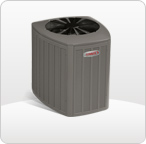 During the hot summer months in Atlanta, chances are you’re going to be spending a majority of your time inside where it’s nice and cool. But are you taking care to make sure that the air quality in your home isn’t unhealthy? It may surprise you to know but the quality of indoor air can often be worse than outdoor air! There can be a variety of reasons for this, including the fact that many homes are built or remodeled without regard to ensuring good airflow, and the presence of large numbers of furnishings, appliances and products which can and do affect air quality. But knowing is half the battle, and there are some definite steps you can take as a homeowner to keep your air quality high and your family healthy.
During the hot summer months in Atlanta, chances are you’re going to be spending a majority of your time inside where it’s nice and cool. But are you taking care to make sure that the air quality in your home isn’t unhealthy? It may surprise you to know but the quality of indoor air can often be worse than outdoor air! There can be a variety of reasons for this, including the fact that many homes are built or remodeled without regard to ensuring good airflow, and the presence of large numbers of furnishings, appliances and products which can and do affect air quality. But knowing is half the battle, and there are some definite steps you can take as a homeowner to keep your air quality high and your family healthy.
There are a number of indicators that when present can indicate poor air quality in a home. Here is a quick checklist of things to watch for:
- a stuffy, moldy or mildewy smell in the house
- a detectable lack of fresh air – air seems to “sit” in one place in the house
- damaged or degraded air conditioning equipment, or air conditioning equipment not functioning as it should
- asthmatic or allergic reactions that occur only when you enter your house and not outside
- visible evidence of mold growth anywhere in the house
A well maintained and fully functional air conditioning system is simply the best way to keep the air quality in your home good and your family healthy. Keeping the humidity in your home at a healthy level is just as important to air quality as air circulation, as molds and dust mites alike thrive in humid environments. A well-functioning air conditioner should also act as a dehumidifier, attacking this threat head-on, so call R.S. Andrews if you suspect your AC isn’t performing as it should.
The importance of an optimally functioning air conditioning system to your indoor air quality simply cannot be overstated – when working as intended, your AC will be providing cooler air, forcing air to circulate properly, and lowering the humidity in your home all at once. Scheduling regular maintenance with R.S. Andrews is the easiest way for you to make sure your AC is not only cooling your home in an energy and cost-efficient way but drastically improving the air quality, and your family’s health, as well.
Here are some other easy and effective steps any homeowner can take to improve their indoor air quality.
- Keep your floors clean and fresh by using a vacuum that has a strong suction, rotating brushes, and if possible, a HEPA filter, which will help ensure that particulates aren’t blown back out of the vacuum cleaner in the exhaust.
- Mopping picks up dust, dirt and microbes that vacuuming can miss – even just plain water on your mop is effective at this, and saves you from introducing more soaps and cleaners into your home.
- Put a large floor mat at every door to your home. If the mat is sufficiently large, even those who don’t carefully wipe their feet upon entering will leave most of the dirt, pesticides and other chemicals on the mat instead of tracking it inside the floor and to become part of the air in your home. To take this a step further, ask people to remove their shoes when entering your home – that way there’s no chance that they’ll be bringing anything in with them.
The above steps can help, but making sure your air conditioning is running as well as it possibly can is the most important way you can protect your indoor air quality as Atlanta endures temperatures in the 100s this summer.
Check back soon for Part 2 – Air Quality and Energy Costs, and remember to call R.S. Andrews if you have any questions about your AC or ways we can help keep the air quality in your home home healthy!
